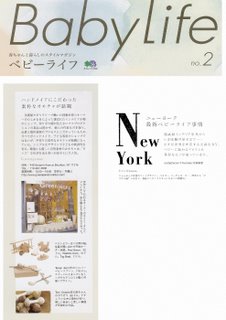
Yesterday we received an exciting package from Japan: the new issue of Baby Life, a very beautifully produced lifestyle magazine for Japanese parents, with Greenjeans featured on page 9! (Also enclosed were some beautiful little paper ornaments with origami geisha and flowering trees on them -- amazing!) The Baby Life piece is by a woman named Yuri Numata who happened into the shop several weeks ago and fell in love with the handmade toys by Frank Ridley, turned wood rattles by Tom Dubois, and the silver spoons by Tamar Kern that we have here. Turns out she was working on a piece about kid-oriented shops in NYC, and she asked if she could feature us! I have no idea what the article actually says, (I hung it in the window anyway), but we are very excited for our first international exposure. Thank you, Yuri!!
Speaking of Japan, I read a piece in New York Magazine this week about something called the Peace Boat. For around $11,000 you can book passage for a three-month cruise during which you'll attend lectures and seminars on peace-related topics, visit countries ravaged by war and poverty in order to lend a hand rebuilding, and meet like-minded people for fun, education, and romance. It sounds like a great way for Japanese college kids and 20-somethings to spend their summer (and a serious wad of cash). There is talk of starting an American version, too. Says the cruise organizer, “We want to become successful in the cruise industry as well as the peace industry." The peace industry? Is that really happening? (See my earlier post about Branding Peace for more on this concept.) Hmmm.
Also from Japan, today I happened upon this frankly inspiring website for an organization called Japan for Sustainability. They write:
"After the Kyoto Conference on climate change in 1997, activities to address global environmental problems gained momentum in Japan and expanded across many sectors. Today one can see many initiatives by the central and local governments, industry, research institutes, universities, non-governmental organizations and individual citizens. We feel that every country has something positive to contribute, and that people in other parts of the world may find useful ideas from Japan, in some of its advanced technologies, systems and partnerships, approaches to information disclosure, and other developments.
"There may also be lessons from the past before the modern day Japan had a tradition of sustainability. The Edo Period, lasting about 300 years, from the early 17th to late 19th century, appears from today's perspective to have been one model of a sustainable society. During that period Japan was self-sufficient in food and energy, had low population growth and recycled almost all materials. One may find clues for a new type of sustainability in the wisdom, craftsmanship and lifestyles of the past."
That last sentence nails it as far as we're concerned.
In unrelated news, tonight we're going out for dinner with our good friend Amy at The Grocery, a Smith Street institution that somehow we've never been to. My mouth is already watering for farmer's market fresh ingredients and a nice bottle of wine...
Until later, arigato gozaimasu!






No comments:
Post a Comment